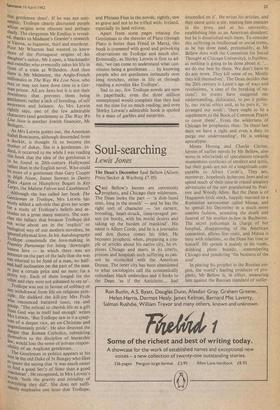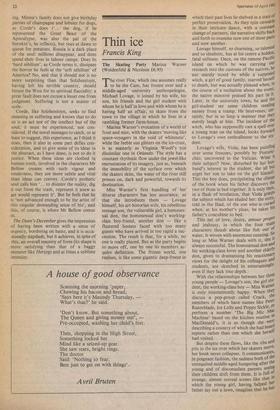Soul-searching
Lewis Jones
The Dean's December Saul Bellow (Alison Press/Secker & Warburg £7.95)
Saul Bellow's heroes are commonly prophets, and Chicago their wilderness. The Dean looks the part — 'a dish-faced man, long in the mouth' — and he has the right sort of character — 'an earnest, brooding, heart-struck, tim9-ravaged per- son (or boob), with his moral desires and taking up the burden of mankind'. His name is Albert Corde, and he is a journalist and don (hence comes his title). He becomes prophetic when, preparing a cou- ple of articles about his native city, he ex- plores Chicago and meets in its courts, prisons and hospitals such suffering as can- not be reconciled with the American Dream. The inner city has been abandoned to what sociologists call the economically redundant black underclass and it looks to the Dean 'as if the Antichrist... had
descended on it'. He writes his articles, and they cause quite a stir, making him enemies in the press and at his university, establishing him as an American dissident; but he is dissatisfied with them. To consider this suffering in intellectual or social terms, as he has done (and, presumably, as Mr Bellow does with the Committee for Social Thought at Chicago University), is fruitless, as nothing is going to be done about it: we do our best by them. We don't have to do any more. They kill some of us,. Mostly they kill themselves'. The Dean decides that the 20th century is Lenin's age of wars and revolutions, 'a time of the breaking of na- tions'; its events have staggered our understanding, dislocated, to put it polite- ly, our social ethics and, as he puts it, 're- arranged our souls': 'there ought to be a supplement to the Book of Common Prayer to cover them'. From the wilderness of Chicago he prophesies thus: 'In these last days we have a right and even a duty to purge our understanding'. He is seeking apocalypse.
Moses Herzog and Charlie Citrine, heroes of earlier novels by Mr Bellow, also move in whirlwinds of speculation towards momentous syntheses of intellect and spirit, but their goals are not of a magnitude com- parable to Albert Corde's. They are, moveover, hopelessly lecherous Jews and so spend much of their time in crazed amatory adventures of the sort popularised by Port- noy and Woody Allen. But the Dean is of Huguenot-Irish stock, happily married to a Rumanian astronomer called Minna, and he spends his December in a much more sombre fashion, attending the death and funeral of his mother-in-law in Bucharest. The secret policeman in charge of her hospital, disapproving of the American connexion, allows few visits, and Minna is busy with relations, so the Dean has time to himself. He spends it mainly in his room, drinking plum brandy, remembering Chicago and pondering 'the business of the soul'.
In placing his prophet in the Russian em- pire, the world's leading producer of pro- phets, Mr Bellow is, in effect, measuring him against the Russian standard of suffer- ing. Minna's family does not give birthday parties of champagne and lobster for dogs, as Corde's does (`... the dog, if he represented the Great Beast of the Apocalypse, was also the pal of the Sorokin's, he reflects), but rises at dawn to queue for potatoes. Russia is a dark place of the soul: millions disappear, and dons spend their lives in labour camps. Does its `hard nihilism', as Corde terms it, dissipate the horror he feels at the 'soft nihilism' of America? No, and that it should not is no more surprising than that Solzhenitsyn, having left his terrible country, should berate the West for its spiritual flaccidity: a great fault does not excuse a lesser one from judgment. Suffering is not a matter of scale.
Corde, like Solzhenitsyn, seeks to find meaning in suffering and knows that to do so is an act not of the intellect but of the soul; it must be experienced, not con- sidered. If the novel manages to catch, or at least to suggest, this experience, as I think it does, then it also in some part defies con- sideration, and to give some of its ideas in the abstract, as l have done, is not to do it justice. When these ideas are clothed in human truth, involved in the characters Mr Bellow creates with such vigour and tenderness, they are more subtle and vital than ideas can convey. Corde's prohetic soul calls him to disinter the reality, dig it out from the trash, represent it anew as art would represent it'. But he feels that he is 'not advanced enough to be the artist of this singular demanding sense of his', and this, of course, is where Mr Bellow comes in.
The Dean's December gives the impression of having been written with a sense of urgency, bordering on haste, and it is occa- sionally slapdash; but it achieves, in spite of this, an overall mastery of form (its shape is more satisfying than that of a baggy monster like Herzog) and at times a sublime intensity.



































 Previous page
Previous page